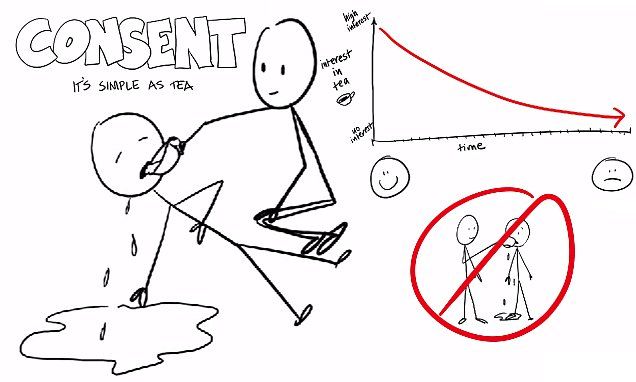By Alice Bello

Image: Emmeline May and Blue Seat Studios
During Integration week, first year students were shown a video entitled “Consent, it’s as simple as tea.” In brief, the video tries to demystify consent by using a metaphor, claiming that asking for consent is like asking someone if they want a cup of tea. If they don’t want tea, don’t force them to drink it. See? Consent is as simple as tea.
At a time where movements like #MeToo and #Balancetonporc are too loud to ignore, I deem it essential for Sciences Po to inculcate in its students appropriate methods of response to dangerous and ambiguous circumstances. Why haven’t we been taught how to react when we’re being followed in the streets, when our personal barriers are being violated, or when we simply don’t feel safe? Some will say it’s a matter of common sense, but if that were the case, we wouldn’t have a whopping 11.2% of students that experience rape or sexual assault. Does a blatantly abstruse video on tea seem like a good way to combat this?
It isn’t normal that the only form of sexual education we’ve received from our school can be summed up in a three-minute video that hides behind a tea metaphor to tell young people not to partake in something as sickening as sexual assault. Behind this albeit witty video however, there hides the main issue of how Sciences Po deals with issues that are central to our age group.
Indeed, sexual assault is just the tip of the iceberg. Sciences Po has failed to provide a conference on the risks of alcohol and drugs, on the importance of sexual safety, and on staying safe in Reims. The closest thing we’ve gotten to this type of seminar – besides the video on tea – was one that took place on March 26. Even so, this meeting was reserved for those participating in Campaign Week with hopes of winning election to the permanent bureaus on campus next year. This six-hour session was supposed to prepare them for the events they’d be organizing within the framework of their pursuit of votes.
This comprehensive assembly sought to give security tips concerning consumption of drugs and alcohol. There, a group of four teachers counseled students on how to react when faced with heavily inebriated individuals, how to deal with violent outbursts, and how to guide someone having a “bad trip”, an unhealthy experience with either drugs or alcohol. An additional section recommended a trust-building exercise in which participants gave their own view of what consent was, in an attempt to give a narrower definition to such a broad topic.
Why on Earth don’t all Sciences Po students have to attend this type of conference? Not only does this place unnecessary pressure on the members of the bureaus to be able to deal with extreme – if not life-threatening – situations, but the knowledge dispensed is crucial for any student that may be placed in a similar position. Give me one Sciences Po student that hasn’t been.
In the United States, elementary school students partake in D.A.R.E, an education program that seeks to prevent the abuse of drugs. If eleven year-old children are taught about how to navigate the stormy seas of addiction, why aren’t eighteen year-olds with no parental supervision let off the hook? Our entry into university life – often the first taste of true freedom for some students – is filled with opportunities that can easily veer into carelessness. I’m not saying Sciences Po should encourage us to be reckless, but it should at least teach us to do so safely.
Sciences Po now relies on student-led initiatives to ensure the safety and well-being of its pupils. Just look at the Period group, which has just started providing sanitary supplies to women at Sciences Po, or the Mental Health Committee, which offers weekly support through anonymous Tea Talks (finally an appropriate use of tea).
The Association Sportive recently held a self-defense class. Although I genuinely applaud this initiative, it was open to a limited number of students who had to pay to attend the class. I don’t lay the blame on the AS, as it should be a mandatory class given to all first-year students during Integration Week, paired with the six-hour seminar a select number of pupils attended last weekend.
I lay the blame on the preconceived notion that school should be a place of modesty, one that doesn’t broadcast the risks of behaviors adopted by its students. Stop talking to us about tea and put words on these events. Ignoring their existence is simply counterproductive. I’d much rather live through six awkward hours than run the risk of being in a situation I don’t feel I have the correct tools to respond to.
Alice is a Parisian New Yorker or a New Yorkan (is that a word?) Parisianer (that’s probably not a word either) hoping to conquer the world of journalism one day. Interests include drinking coffee, reading the New York Times, and reading the New York Times while drinking coffee. The Parisian New Yorker runs once a month.
Other posts that may interest you:
- The Trouble with ‘Ecocide’
- Carbon dioxide removal – hit or miss?
- Local Victories for Turkish Opposition — A Sign of Hope?
- Are France and Japan a Mismatch Made in Heaven?
- A Reflection on Dark Tourism
Discover more from The Sundial Press
Subscribe to get the latest posts sent to your email.





